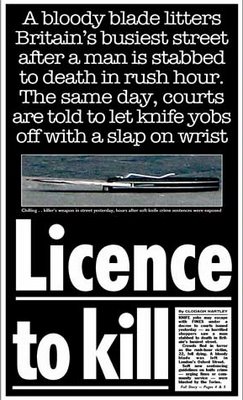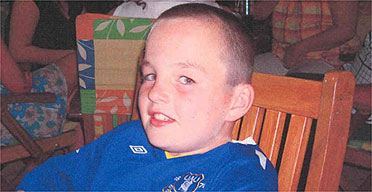Knife crime and how London is more dangerous than Baghdad.
 It's strange, isn't it, how it takes the death of a 16-year-old middle-class white teenager for the media in general to suddenly decide that it's time to talk about how the world is ending under the threat of the blade once again, or at least is in London.
It's strange, isn't it, how it takes the death of a 16-year-old middle-class white teenager for the media in general to suddenly decide that it's time to talk about how the world is ending under the threat of the blade once again, or at least is in London.Last night Newsnight treated us to four "experts", which in reality meant a mother who'd lost her child and now fronts one of those brilliantly named "Mothers Against" groups, as if all mothers aren't against murder, violence or noise music; the new deputy mayor of London, who despite his record in helming a young offender's institution said nothing of any worth whatsoever; Damilola Taylor's father; and err, Melanie Phillips, that well-known expert on all things concerning teenagers and youth crime.
Their solution? Zero tolerance, of course. It doesn't matter that this zero tolerance which so many espouse is based itself on a flawed prospectus, that those who are meant to have implemented it didn't intend to then be extended across the board as politicians and newspaper columnists in this country now demand, or indeed that it was not the "zero tolerance" which had the effect but rather the crime mapping, the keeping of detailed, regularly updated statistics and economic and demographic change, it's become a simple cure-all solution which has supposedly worked and therefore must be tried.
One of the chief proponents of zero tolerance, the Sun, even goes so far today as to claim that New York is now safer than London, as well as talking nonsense about new sentencing guidelines when the judge still has the discretion to impose up to a four-year sentence for someone brought to court for carrying a knife:
Thirteen young men and boys have been slaughtered on the streets of London so far this year.
The capital is now more dangerous than once-notorious New York.
Of course, the Sun is ignoring the actual evidence which proves that New York is actually more dangerous not just than London, but this country as a whole, despite others now claiming that the once notorious city is now some kind of shining beacon of peace and security. It's true that crime has fallen substantially in New York, but unless you disbelieve both the police figures and the British Crime Survey, it's also been falling here for around ten years also.
I've gone into the nitty gritty of the figures in depth before, so let's just deal with the one that can't be argued against: murder figures. In New York in 2006 there were 921 murders. In 2005/6 in London there were 168; in 2006/7 there were 162; and in 2007/08 (financial year) there were 156. Across the entire country in 06/07 there were 755 murders.
Let's continue with the Sun's leader:
Ministers wring their hands and Home Secretary Jacqui Smith refuses to venture out at night.
Parents are terrified every time their kids leave home.
And teenagers walk in fear of being killed by lawless savages who are ready to kill for a laugh.
Fines and community sentences will do nothing to stop this massacre.
And nor will importing failed policies from across the pond.
Labels: bullshit, crime, crime figures, knife crime, New York crime figures, Scum-watch, Sun-watch, teenage murders, zero tolerance



